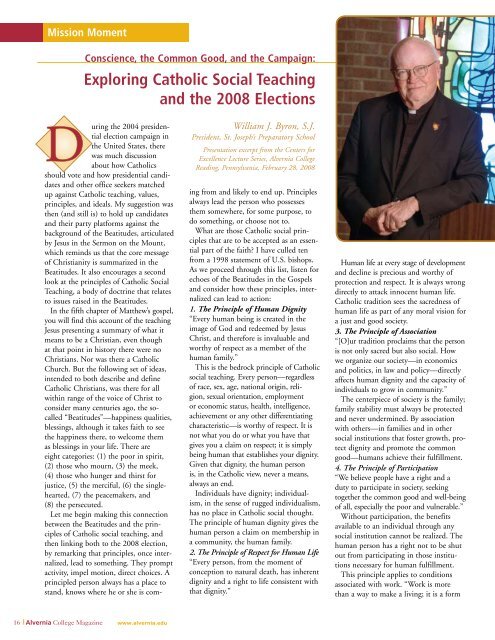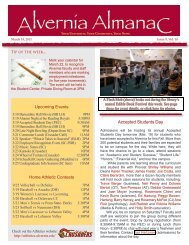Celebrating - Alvernia University
Celebrating - Alvernia University
Celebrating - Alvernia University
Create successful ePaper yourself
Turn your PDF publications into a flip-book with our unique Google optimized e-Paper software.
Copy Mission Here Moment<br />
Conscience, the Common Good, and the Campaign:<br />
Exploring Catholic Social Teaching<br />
and the 2008 Elections<br />
D<br />
uring the 2004 presidential<br />
election campaign in<br />
the United States, there<br />
was much discussion<br />
about how Catholics<br />
should vote and how presidential candidates<br />
and other office seekers matched<br />
up against Catholic teaching, values,<br />
principles, and ideals. My suggestion was<br />
then (and still is) to hold up candidates<br />
and their party platforms against the<br />
background of the Beatitudes, articulated<br />
by Jesus in the Sermon on the Mount,<br />
which reminds us that the core message<br />
of Christianity is summarized in the<br />
Beatitudes. It also encourages a second<br />
look at the principles of Catholic Social<br />
Teaching, a body of doctrine that relates<br />
to issues raised in the Beatitudes.<br />
In the fifth chapter of Matthew’s gospel,<br />
you will find this account of the teaching<br />
Jesus presenting a summary of what it<br />
means to be a Christian, even though<br />
at that point in history there were no<br />
Christians. Nor was there a Catholic<br />
Church. But the following set of ideas,<br />
intended to both describe and define<br />
Catholic Christians, was there for all<br />
within range of the voice of Christ to<br />
consider many centuries ago, the socalled<br />
“Beatitudes”—happiness qualities,<br />
blessings, although it takes faith to see<br />
the happiness there, to welcome them<br />
as blessings in your life. There are<br />
eight categories: (1) the poor in spirit,<br />
(2) those who mourn, (3) the meek,<br />
(4) those who hunger and thirst for<br />
justice, (5) the merciful, (6) the singlehearted,<br />
(7) the peacemakers, and<br />
(8) the persecuted.<br />
Let me begin making this connection<br />
between the Beatitudes and the principles<br />
of Catholic social teaching, and<br />
then linking both to the 2008 election,<br />
by remarking that principles, once internalized,<br />
lead to something. They prompt<br />
activity, impel motion, direct choices. A<br />
principled person always has a place to<br />
stand, knows where he or she is com-<br />
16 <strong>Alvernia</strong> College Magazine www.alvernia.edu<br />
William J. Byron, S.J.<br />
President, St. Joseph’s Preparatory School<br />
Presentation excerpt from the Centers for<br />
Excellence Lecture Series, <strong>Alvernia</strong> College<br />
Reading, Pennsylvania, February 28, 2008<br />
ing from and likely to end up. Principles<br />
always lead the person who possesses<br />
them somewhere, for some purpose, to<br />
do something, or choose not to.<br />
What are those Catholic social principles<br />
that are to be accepted as an essential<br />
part of the faith? I have culled ten<br />
from a 1998 statement of U.S. bishops.<br />
As we proceed through this list, listen for<br />
echoes of the Beatitudes in the Gospels<br />
and consider how these principles, internalized<br />
can lead to action:<br />
1. The Principle of Human Dignity<br />
“Every human being is created in the<br />
image of God and redeemed by Jesus<br />
Christ, and therefore is invaluable and<br />
worthy of respect as a member of the<br />
human family.”<br />
This is the bedrock principle of Catholic<br />
social teaching. Every person—regardless<br />
of race, sex, age, national origin, religion,<br />
sexual orientation, employment<br />
or economic status, health, intelligence,<br />
achievement or any other differentiating<br />
characteristic—is worthy of respect. It is<br />
not what you do or what you have that<br />
gives you a claim on respect; it is simply<br />
being human that establishes your dignity.<br />
Given that dignity, the human person<br />
is, in the Catholic view, never a means,<br />
always an end.<br />
Individuals have dignity; individualism,<br />
in the sense of rugged individualism,<br />
has no place in Catholic social thought.<br />
The principle of human dignity gives the<br />
human person a claim on membership in<br />
a community, the human family.<br />
2. The Principle of Respect for Human Life<br />
“Every person, from the moment of<br />
conception to natural death, has inherent<br />
dignity and a right to life consistent with<br />
that dignity.”<br />
Human life at every stage of development<br />
and decline is precious and worthy of<br />
protection and respect. It is always wrong<br />
directly to attack innocent human life.<br />
Catholic tradition sees the sacredness of<br />
human life as part of any moral vision for<br />
a just and good society.<br />
3. The Principle of Association<br />
“[O]ur tradition proclaims that the person<br />
is not only sacred but also social. How<br />
we organize our society—in economics<br />
and politics, in law and policy—directly<br />
affects human dignity and the capacity of<br />
individuals to grow in community.”<br />
The centerpiece of society is the family;<br />
family stability must always be protected<br />
and never undermined. By association<br />
with others—in families and in other<br />
social institutions that foster growth, protect<br />
dignity and promote the common<br />
good—humans achieve their fulfillment.<br />
4. The Principle of Participation<br />
“We believe people have a right and a<br />
duty to participate in society, seeking<br />
together the common good and well-being<br />
of all, especially the poor and vulnerable.”<br />
Without participation, the benefits<br />
available to an individual through any<br />
social institution cannot be realized. The<br />
human person has a right not to be shut<br />
out from participating in those institutions<br />
necessary for human fulfillment.<br />
This principle applies to conditions<br />
associated with work. “Work is more<br />
than a way to make a living; it is a form






